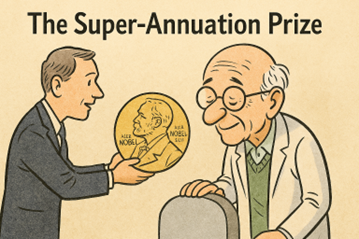



When the Nobel arrives after the scientist has packed away the tools
By Ravishankar Kalyanasundaram
This year’s Nobel Prize in Physics went to John Clarke, Michel Devoret, and John Martinis — three men who, back in 1985, explored quantum effects in superconducting circuits when “quantum computer” still sounded like science fiction. Their quiet experiments showed that even in a metal loop chilled near absolute zero, electricity could behave like an atom — leaping between energy levels and tunnelling through barriers that should have been solid.
At the time, it was academic curiosity. Four decades later, it is the foundation of quantum computing — the superconducting qubit now powering Google and IBM’s race to build machines that can do in minutes what classical computers might take centuries. The discovery didn’t just advance physics; it redesigned the architecture of computing itself.
Yet the applause came long after the scientists had left the lab. The world has built an industry on their ideas, while the laureates have retired. The Nobel Committee, loyal to its motto of “the test of time,” has again arrived faithfully late. Admirable perhaps — but as Einstein once said, “The only reason for time is so that everything doesn’t happen at once.” The committee seems to have taken that literally.
A clock that runs in decades
The Nobel has always moved on its own calendar. It favours the echo of certainty over the noise of novelty. The Bose–Einstein Condensate, predicted in 1924, was rewarded only in 2001. The Higgs Mechanism, described in 1964, earned its medal in 2013 — nearly half a century later. Gravitational waves, predicted by Einstein in 1916, were honoured in 2017, a full century after the prediction. Even quantum teleportation, first shown in the 1990s, waited thirty years for Stockholm to notice.
As Tagore wrote, “The butterfly counts not months but moments, and has time enough.”
The Nobel counts only decades — enough to test patience, not passion.
The missing names of brilliance
The roll of omissions is as revealing as the list of laureates.
Nikola Tesla and Thomas Edison, the twin architects of electrification, never heard the Nobel fanfare. In 1912, when both were under discussion, the committee stepped back from the quarrel and handed the prize to Nils Gustaf Dalén for a lighthouse regulator — a modest flame beside the current that powers civilisation.
The pattern is clear: the Nobel prefers the settled to the struggling, the proven to the pioneering. It honours conclusion more than courage.
Why the delay lingers
The reasons are not malicious; they are institutional.
Sometimes the Nobel comes too early, celebrating work later overturned. Sometimes it arrives too late, waiting for every doubt — and every discoverer — to disappear. At times the motive is symbolic or political, meant to send a message more than reward a result. And often, the prize leans toward theoretical purity rather than practical change.
These instincts preserve prestige but distance recognition from relevance.
The revolutions unfolding now
If the committee looked beyond completed history, it would see revolutions already in motion.
Artificial intelligence is decoding biology and designing drugs faster than any laboratory; fusion energy is edging toward clean, infinite power; quantum communication is securing data across continents; green hydrogen is redefining energy economics; and neural interfaces are letting thought command technology.
These are not promises of tomorrow — they are laboratories humming today. And when their breakthroughs transform our lives, as they surely will, one hopes Stockholm will not wait another forty years to send its telegram.
From reverence to relevance
There is virtue in caution, but not in dormancy.
A Nobel Prize should keep today’s scientists awake with hope, not asleep under the comfort of legacy.
Recognition should ignite, not embalm. It should make a young researcher — in Chennai, Cambridge, or Kyoto — lift her eyes from the microscope and whisper, “Someday.”
As Alfred Nobel himself wrote, the prizes were meant for those who confer “the greatest benefit to humankind.” Benefit need not wait for half a lifetime. Sometimes it glows already — in the hum of a lab, the code of a student, the spark of an idea.
Science moves forward; its medals must too. Let the Nobel remain a mark of greatness but let it also become a living encouragement for those building tomorrow.
After all, what honour is it if the world’s most prestigious prize still arrives by registered post to a retired address?